|
|
|
Sort Order |
|
|
|
Items / Page
|
|
|
|
|
|
|
| Srl | Item |
| 1 |
ID:
182761
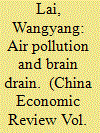

|
|
|
|
|
| Summary/Abstract |
This paper provides one of the few evidence about migration responses among talents to air pollution. Specifically, we investigate the impact of PM2.5 concentration on job location decisions of Chinese college graduates at the beginning of their professional careers. The results indicate that a 10-unit increase in PM2.5 concentration raises college graduates' probability to leave their current city by 10% point. We also find larger impacts on graduates from elite colleges and less polluted hometowns. Our empirical results are consistent with a simple model in which the location choice of college graduates depends on their wage payment and air pollution. Our findings supplement existent literature in documenting important ways in which air pollution may associate with the loss of highly-educated talents.
|
|
|
|
|
|
|
|
|
|
|
|
|
|
|
|
| 2 |
ID:
147830
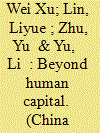

|
|
|
|
|
| Summary/Abstract |
The transformation to a socialist market economy in China has
unleashed millions of migrants from the rural interior searching for
better economic opportunities in coastal areas over the past three decades.
|
|
|
|
|
|
|
|
|
|
|
|
|
|
|
|
| 3 |
ID:
147441
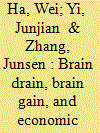

|
|
|
|
|
| Summary/Abstract |
We have used Chinese provincial data (1980–2005) to examine the effects of permanent and temporary emigration on human capital formation and economic growth in source regions. First, we find that permanent emigration is conducive to the improvement of both middle and high school enrollment. In contrast, while temporary emigration has a significantly positive effect on middle school enrollment it does not affect high school enrollment. Moreover, the different educational attainments of temporary emigrants have different effects on school enrollment. Specifically, the proportion of temporary emigrants with high school education positively affects middle school enrollment, while the proportion of temporary emigrants with middle school education negatively affects high school enrollment. Finally, we find that both permanent and temporary emigration has a detrimental effect on the economic growth of source regions.
|
|
|
|
|
|
|
|
|
|
|
|
|
|
|
|
| 4 |
ID:
153068


|
|
|
|
|
| Summary/Abstract |
This study develops a dynamic model that integrates military intelligence into the defense capability of the country and the optimal allocation of its government budget. We assert that the effectiveness of the country’s military intelligence is contingent on the quality of its human capital, which, in turn, implies a long-term positive relationship between the government’s various civilian expenditures and its capacity to achieve a cost-effective intelligence and, hence, military capability. This relationship is developed within a multiple-period arms race model between two rivals. Using this model and stylized data for the Israeli–Syrian arms race, we show that an appropriate budget shift from defense to civilian expenditures during the initial periods of the planning horizon will gradually (over a decade, say) increase the quality of human capital in the country and, thus, the effectiveness of its intelligence, which, in turn, will increase the country’s future security and welfare.
|
|
|
|
|
|
|
|
|
|
|
|
|
|
|
|
| 5 |
ID:
149742
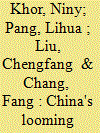

|
|
|
|
|
| Summary/Abstract |
Accumulation of human capital is indispensable to spur economic growth. If students fail to acquire needed skills, not only will they have a hard time finding high-wage employment in the future but the development of the economies in which they work may also stagnate owing to a shortage of human capital. The overall goal of this study is to try to understand if China is ready in terms of the education of its labour force to progress from middle-income to high-income country status. To achieve this goal, we seek to understand the share of the labour force that has attained at least some upper secondary schooling (upper secondary attainment) and to benchmark these educational attainment rates against the rates of the labour forces in other countries (e.g. high-income/OECD countries; a subset of G20 middle-income/BRICS countries). Using the sixth population census data, we are able to show that China's human capital is shockingly poor. In 2010, only 24 per cent of China's entire labour force (individuals aged 25–64) had ever attended upper secondary school. This rate is less than one-third of the average upper secondary attainment rate in OECD countries. China's overall upper secondary attainment rate and the attainment rate of its youngest workers (aged 25–34) is also the lowest of all the BRICS countries (with the exception of India for which data were not available). Our analysis also demonstrates that the statistics on upper secondary education reported by the Ministry of Education (MoE) are overestimated. In the paper, we document when MoE and census-based statistics diverge, and raise three possible policy-based reasons why officials may have begun to have an incentive to misreport in the mid-2000s.
|
|
|
|
|
|
|
|
|
|
|
|
|
|
|
|
| 6 |
ID:
103917
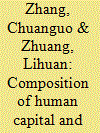

|
|
|
|
|
| Publication |
2011.
|
| Summary/Abstract |
This study examines the effect of the composition of human capital on economic growth in China, using the Generalized Methods of Moments (GMM) method. The results show that tertiary education plays a more important role than primary and secondary education on economic growth in China. Moreover, the role of the composition of human capital on regional economic growth is relevant to the level of development. The more developed provinces benefit more from tertiary education, while underdeveloped ones depend more on primary and secondary education.
|
|
|
|
|
|
|
|
|
|
|
|
|
|
|
|
| 7 |
ID:
053844


|
|
|
| 8 |
ID:
130919


|
|
|
|
|
| Publication |
2014.
|
| Summary/Abstract |
The success of individuals in securing employment requires a significant search effort. This article presents an empirical analysis of the determinants of job search intensity among a cross-section of workers in Accra, Ghana. Based on a sample of 404 workers drawn from 100 formal sector firms in Accra, we adopt the Poisson regression estimation technique to indicate that age, years of schooling, labour market experience, sex of household head, firm size and ethnic group significantly influence job search intensity. Measures to expose young job seekers to the world of work via internship and apprenticeship could accelerate their transition to employment.
|
|
|
|
|
|
|
|
|
|
|
|
|
|
|
|
| 9 |
ID:
178487
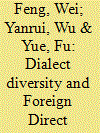

|
|
|
|
|
| Summary/Abstract |
This paper examines the relationship between dialect diversity and foreign direct investment (FDI) using a dataset of 230 Chinese cities for the period 2000–2014. We find that dialect diversity and FDI absorption are negatively correlated. However, this negative relationship disappears gradually over time. Several underlying mechanisms are identified. In particular, it is found that dialect diversity impedes human capital development and hence obstructs FDI absorption. Our results also show that there are threshold and spatial spillover effects. This research increases knowledge of FDI location choice and has implications for foreign investment policymaking.
|
|
|
|
|
|
|
|
|
|
|
|
|
|
|
|
| 10 |
ID:
185959


|
|
|
|
|
| Summary/Abstract |
This article examines the effect of academic qualifications and networking ties towards the evolvement of micro, small-medium, and large ethnic Indian enterprises in Malaysia. The study is based in multicultural Malaysia, where certain policies were implemented in favor of one specific ethnicity. Research indicates that better academic qualifications through transgenerational succession affect how entrepreneurs form connections with their families, co-ethnic networks, and inter-ethnic networks to develop their businesses. This article explains that while micro and smaller firms are choosing to remain in their ethnic identity, medium and larger corporations are willing to shed their ethnic identity for the rapid growth of their businesses. A framework is built from the understanding of literature and past evidence on ethnic Indian entrepreneurship in Malaysia. This article demonstrates the disparities of Malaysian Indian businesses that have progressed differently over the generations, due to the impact of human and social capital.
|
|
|
|
|
|
|
|
|
|
|
|
|
|
|
|
| 11 |
ID:
181473


|
|
|
|
|
| Summary/Abstract |
This paper advances research in the resource curse literature in several directions. Firstly, using different measures of oil dependence and abundance, it investigates the validity of the oil curse hypothesis in energy-rich developing countries. Secondly, the paper studies the impact of human capital, institutional quality, and trade openness on the growth of these countries. Thirdly, it examines the interaction effect of human capital and oil dependence/abundance on the growth of oil-rich developing counties. Fourthly, we estimate a set of panel data models by the Generalized Method of Moments (GMM) to address the endogeneity problem. The estimation results confirm the oil curse hypothesis. Furthermore, our findings underscore the significant role of higher human capital, better institutional quality, and trade openness in boosting economic growth. These results are robust to the way the quality of institutions is measured. Moreover, we find a threshold level for human capital above which the oil curse vanishes. Our finding, hence, highlights the crucial role of human capital in offsetting the adverse effect of oil abundance/dependence on output growth. The fact that poor quality of human capital and weak institutions hinder economic growth has important policy implications for social planners and policymakers in oil-rich developing countries.
|
|
|
|
|
|
|
|
|
|
|
|
|
|
|
|
| 12 |
ID:
119157
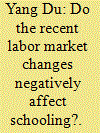

|
|
|
|
|
| Publication |
2013.
|
| Summary/Abstract |
The Chinese labor market has transitioned from a dual labor market to a neoclassical labor market. With wages increasing for skilled workers, the impact on schooling must be considered by policy-makers. Taking advantage of national representative data for 2005 and 2010, the present paper examines the hypothesis that increasing opportunity costs reduce children's schooling. The empirical result is of particular relevance to poor areas, where people tend to have high discount rates and place more value on real time income. Although the total public investment in education has been increasing, our findings suggest that targeting relevant regions and compensating opportunity costs will improve the efficiency of education investments.
|
|
|
|
|
|
|
|
|
|
|
|
|
|
|
|
| 13 |
ID:
186223
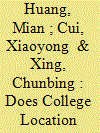

|
|
|
|
|
| Summary/Abstract |
Based on a representative survey of new college graduates in China, we present a job location choice model that allows for a self-selection effect in college regions by considering region-dependent heterogeneous preference for job locations and unobservable location features. We also treat endogenous housing costs using the method developed by Berry et al. (1995). Our estimation results show that college education significantly increases graduates' likelihood of working in the city where their college is located. However, a model that does not consider the self-selection effect overestimates this impact. The impact of college location on a graduate's migration decision varies considerably across cities. There is significant heterogeneity between students from universities of different tiers and rural versus urban areas. Meanwhile, the graduates show a marked home preference when choosing their job locations, and they tend to avoid working in cities with high housing costs. These findings shed light on debates on place-based higher education policies and spatial distribution of human capital with a high level of education.
|
|
|
|
|
|
|
|
|
|
|
|
|
|
|
|
| 14 |
ID:
168341
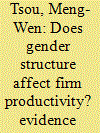

|
|
|
|
|
| Summary/Abstract |
This study examines the impact of gender workforce composition on firm productivity. Using a large sample of Chinese manufacturing firms and conditional on human capital-related controls, we find that firms with a greater share of female workers demonstrate lower productivity. However, our results suggest that increasing the fraction of highly educated female workers significantly improves firm performance. This effect is evident for all private firms regardless of their trade orientation and foreign firms undertaking purely domestic sales. However, the effect does not exist in the case of state-owned and export-oriented foreign enterprises. Compared with medium-sized and large firms, small firms benefit more from gender diversity at high education level. Finally, the share of highly talented female workers indicates better firm performance in more feminized industries.
|
|
|
|
|
|
|
|
|
|
|
|
|
|
|
|
| 15 |
ID:
159055


|
|
|
|
|
| Summary/Abstract |
Although the pay gap between executives and employees has received considerable attention, its economic consequences remain unclear due to the unavailability of data. In this study, we examine the effects of the pay gap on firm innovation by using data from Chinese listed firms. We show that: 1) the first-order effect of pay gap on firm innovation is significantly positive, supporting the tournament theory; 2) however, when pay gap is relatively high, the importance of comparison theories increases; 3) high management pay premiums provide incentives for management to devote to innovation activities, while pay premiums for ordinary employees impede firm innovation; and 4) both the employee's human capital and state ownership play significant roles in the negative effects of employee pay premiums on firm innovation. Overall, we provide critical insights and a serious challenge for regulators in China. The policy implications of this study could be of interest to regulators who intend to encourage firm innovation.
|
|
|
|
|
|
|
|
|
|
|
|
|
|
|
|
| 16 |
ID:
126680
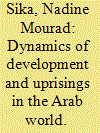

|
|
|
|
|
| Publication |
2013.
|
| Summary/Abstract |
This essay examines the structural economic reform measures undertaken in the Arab world in the past two decades. Developmental projects in the region have attained growth in gross domestic product, higher levels of human capital, and stable governments. These, however, have been accompanied by corruption, structural economic problems, social exclusion, and negligence of good governance and the rule of law. This essay suggests that the juxtaposition of economic reform and liberalization with corruption, authoritarianism, and absence of good governance were a recipe for the social tumult that became the Arab Spring. Social unrest will remain the rule rather than the exception in the Arab region for the foreseeable future, especially in countries that have undergone regime change, such as Egypt and Tunisia, due to the lack of expected economic and political reforms.
|
|
|
|
|
|
|
|
|
|
|
|
|
|
|
|
| 17 |
ID:
159048
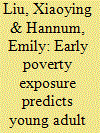

|
|
|
|
|
| Summary/Abstract |
Comparative research suggests that poverty in childhood, and especially in the early years, impedes educational attainment. With longitudinal data from China, we estimate hazard models of dropping out of school in young adulthood with two dynamic measures of childhood poverty: poverty spell indicators that distinguish poverty in early childhood, middle childhood, and adolescence, and poverty indices that measure the depth of poverty and distinguish chronic from transient poverty.
Four main results emerge: 1) Children who experience spells in poverty leave school at a higher rate than others, even adjusting for poverty in later periods; 2) Transient poverty is more widespread, and shows a greater negative association with school-leaving, than chronic poverty; 3) Early childhood poverty shows greater negative associations with education outcomes than poverty in later periods; and 4) Girls may be more susceptible than boys to early poverty. We further test two possible mechanisms of impact: early nutrition poverty and school fees. While lower protein intake at an early stage of life is related to poorer educational outcomes in young adulthood, adjusting for nutritional deprivation does not attenuate the associations of early transient income poverty. Results do not suggest that cohorts that experienced school-fee abolishment policies experienced different poverty effects than other cohorts.
|
|
|
|
|
|
|
|
|
|
|
|
|
|
|
|
| 18 |
ID:
159034
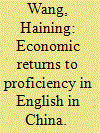

|
|
|
|
|
| Summary/Abstract |
We examine economic returns to proficiency in English in China using two waves of the China Labor-Force Dynamics Survey (CLDS). We find positive earnings returns to proficiency in English. We find considerable heterogeneity in the economic returns to proficiency in English across age groups, coastal and inland provinces, levels of education and occupation. We find that the returns to proficiency in English are higher in the coastal region, higher for women and evidence of education-language and skill-language complementarity. We also see differences in the economic returns to English between urban and rural residents and between rural-urban migrants and urban locals. Our findings help to explain why the demand for learning English is so high in China, as well as having implications for the Chinese government at a time when it is re-evaluating the importance attached to learning English in the curriculum.
|
|
|
|
|
|
|
|
|
|
|
|
|
|
|
|
| 19 |
ID:
130981
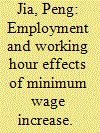

|
|
|
|
|
| Publication |
2014.
|
| Summary/Abstract |
Using a difference-in-differences model, the present paper provides empirical evidence of minimum wage effects on employment and working hours in China. The results show that male employment is not affected by a minimum wage increase, although men's working hours do increase. In contrast, female employment is more likely to be negatively affected by a minimum wage increase, while their working hours remain unchanged. This may lead to women being in a more disadvantaged position in the workforce, and adopting a monthly minimum wage may induce firms to extend men's working hours. Therefore, to better protect disadvantaged workers, we suggest that minimum wage regulation should focus on the target group of less-educated women, and that a unified minimum hourly wage needs to be set for both full-time and part-time workers. Meanwhile, the importance of human capital accumulation should be addressed in alleviating the negative effects of minimum wage increases.
|
|
|
|
|
|
|
|
|
|
|
|
|
|
|
|
| 20 |
ID:
130980
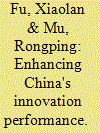

|
|
|
|
|
| Publication |
2014.
|
| Summary/Abstract |
Transforming China into an innovation-driven economy has been one of the top priorities of the Chinese Government. This paper examines the policy choices involved in the extended national innovation performance framework for creating an open innovation system. Innovation capabilities, incentives and institutional frameworks are examined. The paper argues that China should continue to increase its investment in R&D and in education, and that there should also be an attempt to strengthen the incentive system at the macro, meso and micro levels. This strengthening may include reforms to: release the power of competition and guide resources towards innovative sectors; adopt appropriate human resource management, such as appraisal and remuneration systems; create effective policies for research funding management; and evaluate the efficiency of research to encourage the creativity of researchers, managers and employees. The paper also discusses the space for industrial policy in the 21st century.
|
|
|
|
|
|
|
|
|
|
|
|
|
|
|
|
|
|
|
|
|